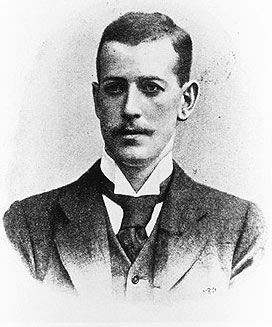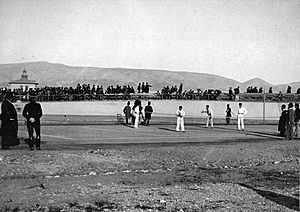John Boland (Irish nationalist politician) facts for kids
Quick facts for kids
John Pius Boland
KSG
|
|
|---|---|
 |
|
| Member of Parliament for South Kerry |
|
| In office October 1900 – December 1918 |
|
| Preceded by | Thomas Joseph Farrell |
| Succeeded by | Fionán Lynch |
| Personal details | |
| Born | 16 September 1870 Dublin, Ireland |
| Died | 17 March 1958 (aged 87) London, England |
| Political party | Irish Parliamentary Party |
| Spouse | Eileen Moloney (1876–1937) |
| Children | 1 son, 5 daughters, including Honor |
| Alma mater | |
| Occupation | Politician and Tennis Player |
| Medal record | ||
|---|---|---|
| Olympic Games | ||
| Men's tennis | ||
| Representing United Kingdom | ||
| Gold | 1896 Athens | Singles |
| Representing a |
||
| Gold | 1896 Athens | Doubles |
John Mary Pius Boland (born September 16, 1870 – died March 17, 1958) was an amazing Irish person. He was a gold medal-winning tennis player at the very first modern Olympic Games. He was also a Nationalist politician. He served as a Member of Parliament (MP) in the House of Commons for South Kerry from 1900 to 1918.
Contents
Early Life and Education
John Boland was born in Dublin, Ireland. His father, Patrick Boland, was a businessman. After his mother passed away in 1882, John and his six brothers and sisters were looked after by their uncle, Nicholas Donnelly. Nicholas was a bishop in Dublin.
John went to two private Catholic schools. One was in Dublin, Ireland, and the other was in Birmingham, England. These schools were influenced by a famous person named John Henry Newman. John became the head boy at the school in Birmingham. Going to schools in both Ireland and England helped him understand the politics of both places. This was important later when he became a politician.
In 1892, he earned a degree from London University. He also studied law at Christ Church, Oxford. Even though he became a lawyer in 1897, he never actually worked as one.
Gold Medals at the First Modern Olympics
John Boland became the first Olympic champion in tennis for Great Britain and Ireland. This happened at the first modern Olympic Games in Athens, Greece, in 1896.
He was visiting a friend in Athens during the Olympics. His friend, Thrasyvoulos Manos, was on the organizing committee. Manos suggested that John enter the tennis tournament. John agreed and surprised everyone by winning the singles tournament! He beat players from Germany and Greece to win the gold medal.
Then, John teamed up with Friedrich Traun from Germany. Traun was the player John had beaten in the first round of the singles. Together, they won the doubles event too! They defeated two Greek teams to earn another gold medal.
When the flags were raised to honor their victory, John noticed that only the British and German flags were there. He told the officials that he was Irish. He described the Irish flag: "It's a gold harp on a green ground." The officials then agreed to prepare an Irish flag for him.
A Voice for Ireland in Politics
After visiting Kerry, John Boland became worried that many local people couldn't read or write. He also cared a lot about the Irish Language.
His strong Irish pride was popular in Ireland. Because of this, and his friendship with John Redmond, he was asked to become a politician. He joined the Irish Parliamentary Party. He became the Member of Parliament (MP) for South Kerry. He held this position from 1900 to 1918. He often ran for election without anyone running against him. He stepped down from politics in 1918.
In 1908, John was chosen to be part of a group that helped create the National University of Ireland. This university is very important for education in Ireland.
From 1926 to 1947, he worked as the General Secretary for the Catholic Truth Society. This group helps share Catholic teachings.
John Boland received a special honor from the Pope. He became a Knight of St. Gregory because of his important work in education. In 1950, he received an honorary doctorate degree from the National University of Ireland.
Family Life
John Boland married Eileen Moloney in 1902. They had one son and five daughters. One of his daughters, Honor Crowley, also became a politician. She followed in her husband's footsteps and served as a TD (a member of the Irish Parliament) for South Kerry. Another daughter, Bridget Boland, became a playwright who wrote plays like The Prisoner.
Later Years
John Boland passed away at his home in London on St. Patrick's Day, March 17, 1958.
See also
 In Spanish: John Pius Boland para niños
In Spanish: John Pius Boland para niños


